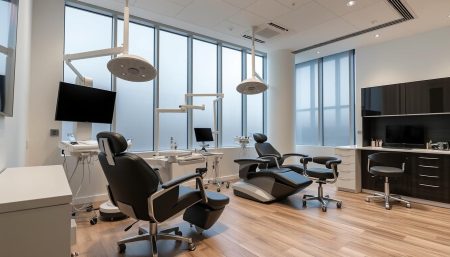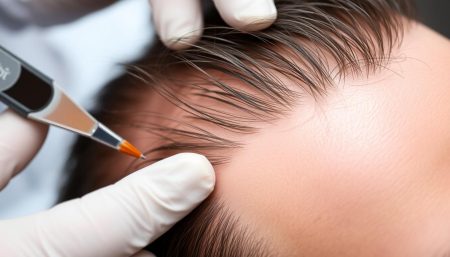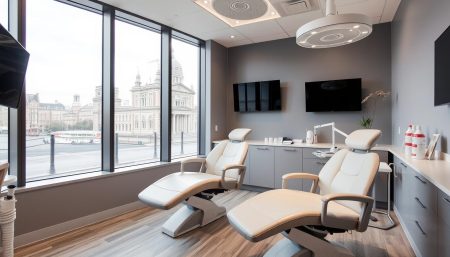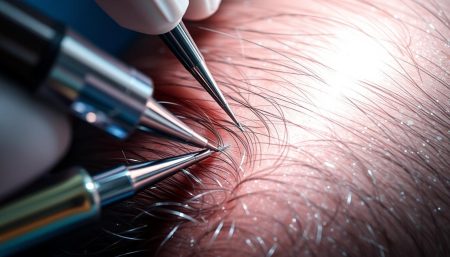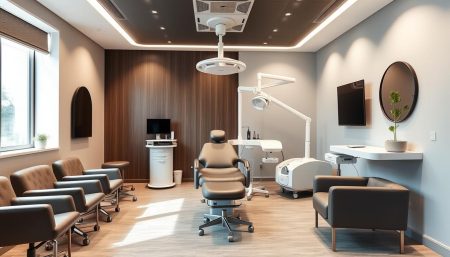There are many theories and myths about hair health. One of the most debated is if masturbation and hair loss are linked. This article aims to clear up the confusion by looking at the facts. It’s important to know that the truth is based on evidence, not just rumors.
Many people lose their hair at some point, leading them to look for reasons. Some think their hair loss might be due to their sexual habits. But is there really a connection? We will look into this topic carefully, focusing on what science says about hair and masturbation.
Key Takeaways
- Understanding the difference between sexual health myths and hair loss facts is crucial.
- Scientific evidence is required to substantiate any claims about masturbation and hair loss.
- It’s important to discuss and debunk common misconceptions surrounding hair health.
- Uncovering the truth can help alleviate unwarranted concerns linked to sexual behaviors.
- Sexual well-being is an essential part of our lives but requires accurate knowledge to navigate effectively.
Understanding Hair Loss: Basics and Myths
Hair loss is a natural part of life, but it affects many people worldwide. Knowing the common causes of hair loss and separating fact from myth is key. This section will cover the hair growth cycle, normal shedding, and debunk common myths.
The hair growth cycle has three phases: anagen (growth), catagen (transitional), and telogen (resting). Each hair is in a different phase, making daily hair loss normal. Losing 50 to 100 hairs a day is usually okay.
Understanding these cycles is crucial. Disruptions in these phases can lead to common causes of hair loss.
Many myths confuse people about hair health. One myth is that washing hair too much causes hair loss. But, keeping hair clean is important and doesn’t lead to hair loss unless done very harshly.
- Genetic predisposition
- Hormonal changes (e.g., pregnancy, menopause)
- Medical conditions (e.g., thyroid disorders, anemia)
- Nutritional deficiencies
- Stress
- Hairstyling practices
Addressing these factors can help keep your hair healthy. It’s a basic part of hair loss prevention tips.
Let’s clear up a common myth: masturbation causing hair loss. There’s no scientific proof for this claim. It’s not a valid concern when talking about hair loss prevention tips.
To give a clearer view, here’s a table comparing types of hair loss and their possible causes:
| Type of Hair Loss | Possible Triggers |
|---|---|
| Androgenetic Alopecia | Genetics, Hormones |
| Telogen Effluvium | Stress, Dietary changes, Illness |
| Anagen Effluvium | Chemotherapy, Toxic substances |
| Alopecia Areata | Autoimmune reactions |
This table shows why knowing the common causes of hair loss is important. It helps in using effective hair loss prevention tips and clears up myths that don’t belong in trichology.
Does Masturbation Cause Hair Loss?
Many people wonder if masturbation can lead to hair loss. We’re here to debunk myths about masturbation and hair loss. We’ll look at what scientific research says about this topic.
Common Misconceptions About Masturbation and Hair
For years, some have believed that masturbation causes hair loss. These ideas come from old myths that say sex harms your health. We’ll check these claims against real science.
Analyzing the Claims: Scientific Perspective
Looking at the science, there’s no proof that masturbation leads to hair loss. Research on hormones, stress, and diet shows no link. Instead, genetics, hormones, and lifestyle choices matter more.
Understanding hair health helps clear up myths. It also teaches us how to really care for our scalps and hair.

Effects of Masturbation on Hair Loss: Separating Fact from Fiction
When we talk about masturbation and hair health, it’s key to look at the facts. There’s a lot of talk about how lifestyle choices, like masturbation, can affect our bodies. But we need to check the evidence to know what’s true.
Masturbation is a natural part of life for many people. Scientists have studied its effects on the body, especially if it causes hair loss. We look at studies that show if masturbation changes hair growth or loss.
One way to understand this is by looking at hormones. Hormones like testosterone and DHT are linked to hair loss. While masturbation might change hormone levels briefly, promoting hair growth naturally depends on things like genetics, diet, and health.
To clear up any confusion, let’s look at the facts:
| Aspect | Detail |
|---|---|
| Impact on Hormone Levels | Temporary fluctuation post-masturbation; no long-term influence confirmed. |
| Direct Scientific Links | No direct causation proven between masturbation frequency and hair loss. |
| Natural Hair Growth Promotion | Focus on balanced diet, stress management, and proper hair care. |
In conclusion, while it’s good to keep asking about our bodies, scientific research on masturbation and hair loss shows no strong link. For those wanting to promote hair growth naturally, trying proven methods like eating right, managing stress, and taking care of your scalp might be better.
The Role of Hormones in Hair Health
Hormones are vital for many body functions, including hair growth. Knowing how balanced hormones keep our hair healthy is essential. This part explains how stable hormones help hair stay strong and healthy. It also looks at how changes in hormones, like those from activities like masturbation, can affect hair.
How Balanced Hormones Contribute to Hair Growth
Hormones like estrogen and testosterone greatly affect hair growth. They control how hair follicles work. When hormones are balanced, hair grows well and falls out less early. For example, estrogen makes hair grow longer and thicker, showing why balanced hormones are important for hair.
The Link Between Hormonal Changes and Masturbation
There’s a lot of talk and research about if masturbation changes hormone levels and affects hair. Small changes in hormones from such activities usually don’t harm hair much. Still, knowing about this link helps us keep our hair healthy by supporting hormone balance.
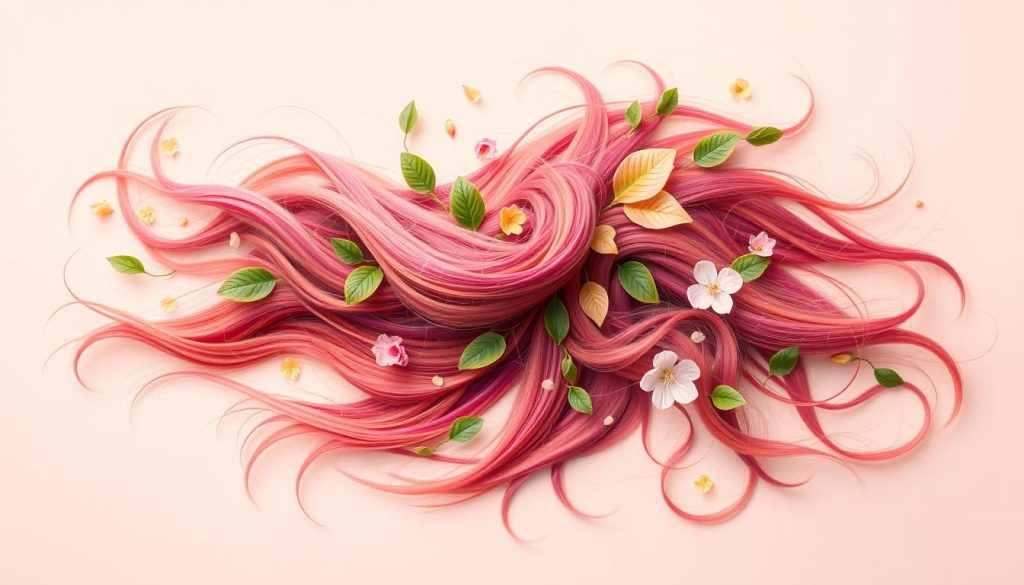
Practicing healthy hair habits like eating right, exercising, and taking care of your hair is key. These habits help keep hormone levels steady and support hair health. They help manage small changes in hormones from daily activities, keeping your hair in good shape.
Examining Scientific Research on Masturbation and Hair Loss
The link between masturbation and hair loss has sparked many debates. This has led to numerous studies aimed at debunking myths about masturbation and hair loss. The key to understanding this relationship lies in scientific research. This research looks into hormones, stress levels, and overall health outcomes.
For decades, studies have searched for a link between masturbation and hair loss. But, they found no solid evidence. The belief that masturbation causes hair thinning is not backed by science. So, science aims to provide clear, evidence-based data to debunk myths about masturbation and hair loss.
| Study Focus | Findings | Year |
|---|---|---|
| Hormonal Changes | No significant impact on long-term hair health | 2010 |
| Psychological Stress | Stress and anxiety from myths may contribute indirectly | 2015 |
| Frequency of Masturbation | No correlation with hair growth cycles | 2020 |
Many peer-reviewed journals have done scientific research on masturbation and hair loss. They found that masturbation is a natural human behavior. It is not a factor in hair loss. This research helps debunk myths that have shaped wrong beliefs for a long time.
Debunking Myths About Masturbation and Hair Loss
Many people believe that masturbation causes hair loss. This section aims to clear up these myths. It will give you facts based on science, helping you understand and prevent hair loss.
First, let’s talk about the myth that masturbation leads to hair loss. There’s no scientific proof that masturbation speeds up hair loss. This myth might come from old stories or a misunderstanding of how hormones work.
No credible scientific study has directly linked the act of masturbation with permanent hair loss. – National Institutes of Health
Let’s look at the facts:
- Masturbation does not cause a permanent increase in DHT (dihydrotestosterone – a hormone linked to hair loss), contrary to popular belief.
- Stress, which can indeed be mitigated by the release of endorphins through masturbation, is a more significant factor in hair health. Thus, indirectly, this act could help reduce hair loss due to stress.
- Genetics, age, and health are the primary determiners of one’s hairline, not personal habits concerning sexuality or masturbation.
Instead of worrying about masturbation, focus on proven ways to prevent hair loss. Here are a few tips:
- Maintain a balanced diet rich in vitamins and minerals to support hair strength and growth.
- Avoid harsh chemical treatments and heat styling tools that can lead to hair breakage and loss.
- Regular scalp massages to enhance blood flow and promote hair health.
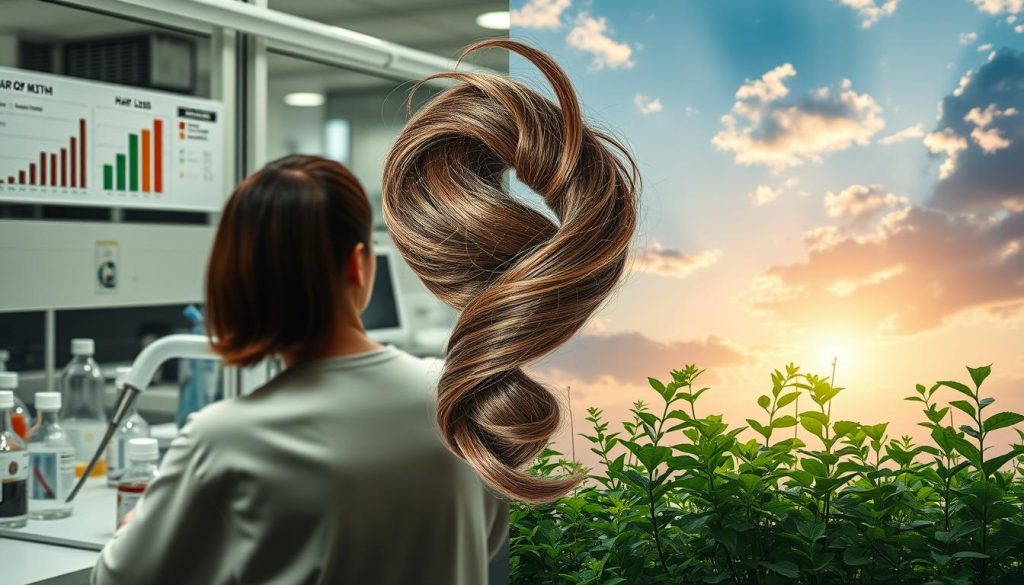
In conclusion, it’s important to deal with the topic of debunking myths about masturbation and hair loss with science and facts. Use this knowledge to improve your health and follow proven hair loss prevention tips.
Common Causes of Hair Loss: What Really Matters
Myths about masturbation and hair loss get a lot of attention. But, it’s key to know the real reasons for hair loss to keep your hair healthy. This part talks about the real causes of hair loss. It helps you figure out what might be affecting your hair.
Genetic Factors and Hair Loss
Genetics are a big deal in hair loss, especially in androgenetic alopecia. This is also known as male or female pattern baldness. It’s inherited and causes hair to thin over time. This can start as early as the teenage years.
Environmental and Lifestyle Influences on Hair Health
Things like pollution, harsh chemicals, and extreme weather can harm your hair. Lifestyle choices like a bad diet, stress, and smoking also play a big role. Starting healthy hair habits can help fight these effects and keep your hair strong.
Let’s dive into how these factors affect hair health:
| Cause | Impact | Prevention |
|---|---|---|
| Genetic Predisposition | Inherited hair thinning and loss | Minoxidil, Finasteride treatments |
| Environmental Pollutants | Damage to hair cuticles | Use protective hair products |
| Stress | Can lead to temporary hair shedding | Stress management techniques |
| Diet | Lack of nutrients affects hair growth | Balanced diet, vitamin supplements |
By managing these factors and adopting healthy hair habits, you can prevent hair loss. This also improves your scalp and hair health.
Healthy Hair Habits Beyond the Myths
It’s important to clear up myths about hair health. But, it’s even more crucial to start healthy hair habits. These habits help make your hair strong and resilient. They include hair loss prevention tips and ways to promote hair growth naturally.
Nourishing Your Hair with Proper Nutrition
Good hair care starts from the inside. Nutrition is key to hair growth and scalp health. Eating foods rich in vitamins, minerals, and proteins helps hair follicles grow strong.
Protein from fish, beans, and nuts is essential. Vitamin A from carrots and spinach is also important. Don’t forget Vitamin E from avocados and almonds, and Zinc from oysters and beef. Omega-3 fatty acids in salmon and flaxseeds make hair shiny and elastic.
Effective Hair Care Routines for Strong, Healthy Hair
Every day, your hair care routine is crucial. It’s not just about picking the right shampoo. It’s also about avoiding damage and supporting natural growth.
- Always be gentle when brushing or detangling wet hair.
- Avoid over-styling with heat tools that can lead to hair breakage.
- Regularly trim ends to prevent split ends from damaging more hair.
- Maintain a regular cleaning schedule but avoid over-washing which can strip natural oils from your scalp.
Following these habits can greatly improve your hair’s health. They are effective in preventing hair loss, reducing the need for medical treatments.
| Daily Habit | Benefit to Hair Health |
|---|---|
| Gentle Detangling | Reduces breakage and protects hair structure. |
| Limiting Heat Styling | Prevents moisture loss and hair structure damage. |
| Regular Trimming | Maintains healthy ends and promotes growth. |
| Balanced Washing Routine | Maintains scalp health and natural hair oils. |

Psychological Impacts of Hair Loss Myths
Many myths, like the one about masturbation causing hair loss, have big psychological impacts of hair loss. These myths can really hurt how we feel about ourselves and make us anxious. It’s key to know the truth about effects of masturbation on hair loss to avoid these mental problems.
Believing in these myths can cause a lot of mental stress. It can mess with how we see ourselves and even our sex lives. To fight against false information, it’s smart to look for trusted sources and get advice from experts. For more help, check out our professional consultation page.
- Understanding the difference between myth and medical fact.
- Discussing personal concerns with a healthcare professional.
- Accessing reliable health information from established sources.
By clearing up the myths about effects of masturbation on hair loss, we can focus on real ways to take care of our hair and health. It’s important to swap false info for real knowledge and support that helps us, not hurts us.
Hair Loss Prevention Tips: Evidence-Based Practices
Knowing the common causes of hair loss is key to stopping it. It’s time to leave myths behind and focus on proven methods. These methods help keep your hair healthy and prevent loss. Here are some strategies backed by science:
- A balanced diet rich in vitamins and minerals: Nutrients like vitamin D, iron, and zinc are vital for hair growth and repair.
- Proper scalp care: Regular cleaning and gentle handling to avoid damage from styling products and heat tools.
- Avoiding harsh chemicals: Minimizing the use of hair treatments that include harmful chemicals can reduce hair breakage and loss.
- Managing stress effectively: Chronic stress is a known cause of hair loss, making stress management techniques crucial.
Understanding your genetic risk for hair loss can help you tackle problems early. Treatments range from over-the-counter options to advanced methods like minoxidil or laser therapy. But, always start with a healthy lifestyle and good hair and scalp care.
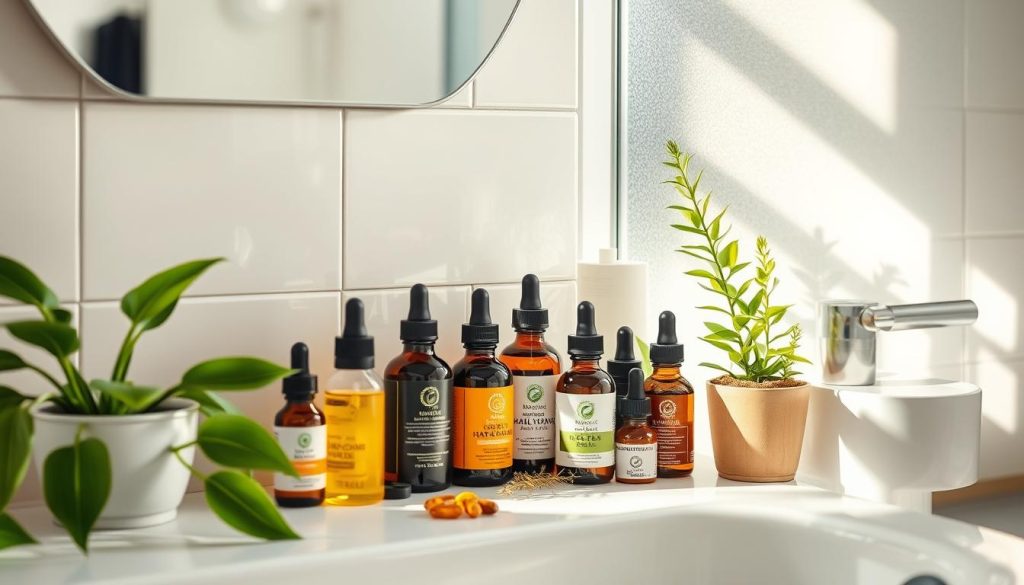
While tackling the common causes of hair loss is vital, a healthy lifestyle is equally important. Regular exercise, staying hydrated, and enough sleep all help your hair health. Always talk to a healthcare provider or dermatologist before starting any treatment. They can give you hair loss prevention tips tailored to your needs.
Importance of Balanced Hormones for Hair Health
The importance of balanced hormones for hair health is huge. Hormones control hair growth and keep the hair cycle going. For healthy hair, knowing about hormonal balance is key. Let’s see how keeping this balance helps your hair stay healthy and strong.
Hormonal problems can cause hair to thin, break, and fall out. For instance, too much DHT can make hair follicles shrink. This shortens the hair growth cycle and leads to thinning and loss. On the other hand, the right amounts of estrogen and progesterone help hair grow and stay on longer.
- Healthy Hair Habits: Keep an eye on hormone levels if you notice changes in your hair.
- Consultation with Healthcare Providers: Get professional help if you think your hormones are off.
- Nutritional Support: Eat foods full of vitamins and minerals to help your hormones and hair.
It’s clear that balanced hormones are more important for hair health than just looking at lifestyle habits like masturbation. Keeping hormones in check not only makes your hair healthier and fuller. It also helps your whole body work better.
In short, healthy hair habits and hormonal balance are key for long-term hair health. Whether you’re dealing with hair problems or just want your hair to grow well, focusing on hormonal health is a smart move.
Promoting Hair Growth Naturally: Practical Tips
For those looking to grow hair naturally, the key is to adopt healthy hair habits. These habits support your hair’s natural growth cycle. Simple, yet effective practices in your daily routine can greatly improve hair health. This is without the need for chemical treatments.
Proper nourishment of your scalp and hair follicles is crucial for natural hair growth. A balanced diet rich in vitamins and minerals is essential. Foods high in vitamins A, C, E, zinc, and iron help make your hair stronger and healthier.
Physical scalp care is also vital for promoting hair growth naturally. Regular gentle scalp massages boost blood circulation. This improves the delivery of nutrients to your hair follicles.
- Avoid harsh chemical products that can strip natural oils from your scalp and hair.
- Use a soft-bristled brush to stimulate the scalp without causing damage.
- Maintain hydration by drinking plenty of water, which benefits your entire body, including your hair.
Reducing mechanical stress on hair is another key aspect of healthy hair habits. This means using heat styling tools less and avoiding tight hairstyles. Choose looser hairstyles to prevent breakage and promote longer hair growth.
- Include a scalp nourishing oil routine weekly to provide essential moisture and encourage healthy hair growth.
- Trim your hair regularly to eliminate split ends that can cause further breakage and hinder hair growth.
- Avoid over-washing your hair to preserve natural oils that condition the hair and scalp.
Promoting hair growth naturally is a long-term commitment. It’s about respecting and enhancing your hair’s natural strengths. By embracing these healthy hair habits, you’ll grow healthier, more vibrant hair. This is all without the need for invasive treatments.
Understanding the Connection: Sexuality, Health, and Hair
Looking into how different health areas connect can reveal important insights. The link between sexual health and overall well-being is especially interesting. It shows how these ties affect our hair, a key part of our looks.
The Impact of Sexual Health on Overall Well-Being
Good sexual health is key for feeling and being well. Doctors know that it helps our minds and bodies. But, sexual health myths can make us think wrongly about its effects, like on our hair.
Exploring the Broader Relationship Between Sexuality and Hair Condition
It’s important to know the truth about common causes of hair loss. There’s no clear link between sex and hair loss. But, hormonal changes, tied to sexual health, can affect hair growth.
Below is a table showing key factors that affect hair health. It shows how these can tie into our sexual health:
| Factor | Impact on Hair Health |
|---|---|
| Hormonal Balance | Changes can cause hair loss or growth. |
| Nutritional Status | Lacking key nutrients can weaken hair. |
| Stress Levels | High stress, including from sexual health, can lead to hair loss. |
| Overall Health | Diseases, like sexually transmitted ones, can affect hair. |
In summary, sexual health impacts our overall health, but its direct effect on hair needs more study. Learning about sexual health myths and the common causes of hair loss helps clear up confusion. It encourages a complete health and hair care approach.
Conclusion
We’ve looked into the false claims about masturbation causing hair loss. We found no truth to these myths. Instead, we learned that genetics, hormones, and lifestyle are key to hair health.
This article focused on real ways to prevent hair loss. We talked about the importance of good nutrition, managing stress, and proper hair care. These are the real ways to keep your hair healthy, not myths about masturbation.
It’s important to be careful when looking at information on hair health. This article reminds us to rely on facts and research. By doing so, we can avoid false information and work towards better hair health and overall well-being.
FAQ
Can masturbating cause hair loss?
No, there is no scientific proof that masturbation causes hair loss.
What are the actual common causes of hair loss?
Hair loss often comes from genetics, hormonal issues, medical problems, not enough nutrients, and some medicines. It’s not usually because of habits like masturbation.
How do hormones affect hair health and growth?
Hormones are key for hair growth and health. Imbalances, especially in androgens, can cause thinning or loss. But, this isn’t linked to hormonal changes from masturbation.
What healthy hair habits can prevent hair loss?
Eating well, washing hair right, avoiding harsh chemicals, and less stress can help prevent hair loss.
Are there any effective ways to naturally promote hair growth?
Yes, eating foods full of vitamins and minerals, scalp massages, and reducing stress can help hair grow naturally.
What is the psychological impact of myths like masturbation causing hair loss?
Such myths can cause stress and anxiety. This can hurt self-esteem and affect sexual health and overall well-being.
How can someone differentiate between myth and fact when it comes to hair loss?
It’s key to look at scientific research and talk to health experts. Be careful of false information without proof.
What is the connection between sexual health and overall well-being when it comes to hair health?
Good sexual health is part of overall well-being. It can help reduce stress and support hair health. But, there’s no direct link found by science between sex and hair condition.
How should someone approach the topic of masturbation and hair health with a professional?
Talk openly with a trusted healthcare provider or dermatologist about your habits and concerns. They can clear up myths and give advice on hair health.
Are there evidence-based practices for preventing hair loss?
Yes, proven ways include minoxidil or finasteride treatments, low-level laser therapy, and sometimes hair transplant surgery to fight hair loss.












